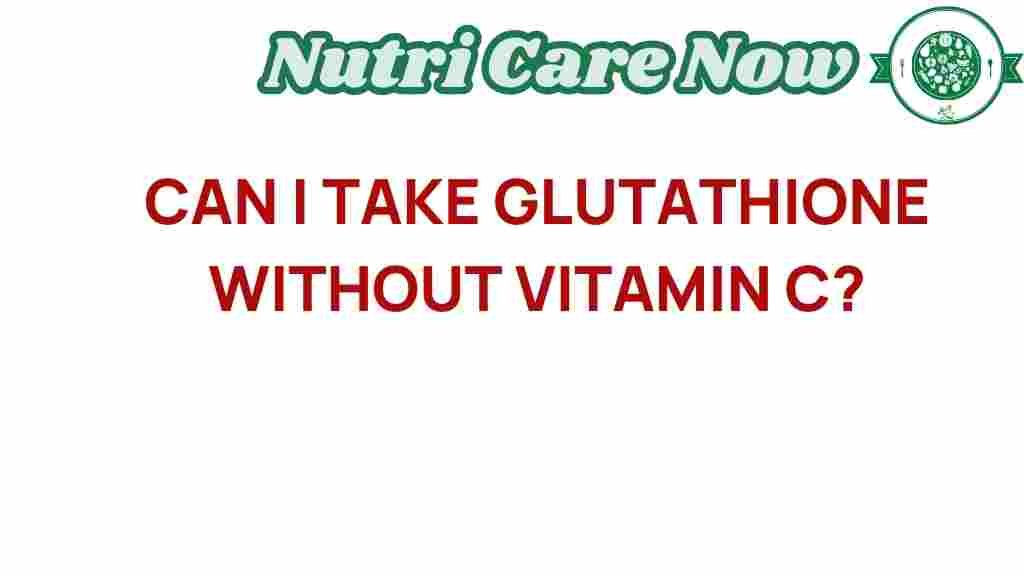The Surprising Connection: Can You Take Glutathione Without Vitamin C?
When it comes to maintaining optimal health, antioxidants play a crucial role, and two of the most talked-about antioxidants are glutathione and vitamin C. Both substances are celebrated for their health benefits, detoxification properties, and immune support. However, many people wonder whether taking glutathione without vitamin C is effective. In this article, we will explore the connection between these two powerful antioxidants, their individual benefits, and what you need to know about their supplementation.
Understanding Glutathione and Vitamin C
Before diving into the question of whether you can take glutathione without vitamin C, let’s first understand what these two antioxidants are.
What is Glutathione?
Glutathione is a powerful antioxidant that is naturally produced in the body. It is composed of three amino acids: cysteine, glutamine, and glycine. Glutathione plays several critical roles, including:
- Detoxification: It helps neutralize free radicals and detoxify harmful substances in the liver.
- Immune Support: Glutathione is essential for the proper functioning of the immune system.
- Skin Health: It contributes to a brighter complexion and reduces the appearance of dark spots.
What is Vitamin C?
Vitamin C, also known as ascorbic acid, is a water-soluble vitamin that is vital for numerous bodily functions. It is well-known for its role in:
- Antioxidant Protection: Vitamin C protects against oxidative stress and helps regenerate other antioxidants.
- Collagen Production: It is crucial for the synthesis of collagen, which is necessary for healthy skin, bones, and connective tissues.
- Immune Function: Vitamin C enhances the immune response and reduces the duration of colds.
The Interrelationship Between Glutathione and Vitamin C
Glutathione and vitamin C work synergistically in the body. While glutathione can function independently, vitamin C plays a supportive role in maintaining and boosting glutathione levels. Here’s how they are connected:
- Regeneration: Vitamin C can help regenerate oxidized glutathione back to its active form, enhancing its antioxidant capacity.
- Synergistic Effects: Both antioxidants can work together to neutralize free radicals more effectively than when taken alone.
- Immune Support: Combined use promotes stronger immune responses, making them a powerful duo for health.
Can You Take Glutathione Without Vitamin C?
Now, let’s address the main question: can you take glutathione without vitamin C? The answer is yes, you can take glutathione independently. However, there are important considerations to keep in mind:
Benefits of Taking Glutathione Alone
When taken alone, glutathione still provides numerous health benefits, including:
- Detoxification: It continues to support liver health and detoxification processes.
- Skin Health: Glutathione supplementation can help reduce pigmentation and improve overall skin tone.
- Chronic Disease Management: It may aid in managing conditions linked to oxidative stress.
Limitations of Taking Glutathione Alone
While taking glutathione alone has its advantages, there are some limitations:
- Reduced Efficacy: Without vitamin C, the antioxidant effects of glutathione may not be as potent.
- Dependency on Other Nutrients: Glutathione levels can also be affected by other nutrients in the body, such as selenium and B vitamins.
How to Supplement with Glutathione
If you decide to supplement with glutathione, here’s a step-by-step process to ensure you are getting the most out of it:
Step 1: Choose the Right Form
Glutathione is available in various forms, including:
- Oral Supplements: Capsules or tablets are common but may have lower absorption rates.
- Intravenous (IV) Therapy: Offers higher bioavailability but requires a healthcare provider.
- Topical Applications: Creams or serums designed for skin health.
Step 2: Determine the Dosage
The optimal dosage of glutathione can vary based on individual needs, but common recommendations include:
- For general health: 250-500 mg per day.
- For detoxification: Up to 1000 mg per day.
Step 3: Consider Additional Nutrients
While vitamin C is not mandatory, considering other nutrients that support glutathione synthesis can be beneficial:
- Selenium: A vital mineral for glutathione production.
- B Vitamins: Particularly B6, B9, and B12, which aid in amino acid metabolism.
Step 4: Monitor Your Body’s Response
After starting supplementation, pay attention to how your body responds. Look for improvements in:
- Energy levels
- Skin appearance
- Overall health
Troubleshooting Tips
If you experience any adverse effects or notice that the supplementation isn’t working as expected, consider the following troubleshooting tips:
- Consult a Healthcare Provider: Always seek professional advice if you have concerns.
- Check for Interactions: Some medications and conditions can affect glutathione levels.
- Evaluate Your Diet: Ensure you’re consuming enough nutrients that support glutathione production.
Conclusion
In summary, while you can take glutathione without vitamin C, the two antioxidants work best in harmony. Glutathione provides significant health benefits on its own, particularly in detoxification, immune support, and skincare. However, incorporating vitamin C into your regimen can enhance the effects of glutathione and support overall antioxidant activity in the body.
Whether you choose to supplement with glutathione alone or alongside vitamin C, being mindful of your nutritional intake is crucial. Always consider consulting with a healthcare professional to determine the best approach for your specific health needs. For more information on antioxidants and their benefits, you can check out this Healthline article.
Remember, a balanced diet rich in nutrients, combined with appropriate supplementation, can lead to better health outcomes and improved quality of life.
This article is in the category Supplements and created by NutriCareNow Team

1 thought on “The Surprising Connection: Can You Take Glutathione Without Vitamin C?”